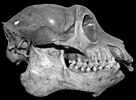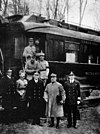From today's featured articleMesopropithecus was a lemur from Madagascar, slightly larger than any of those alive today, but one of the smallest that are known only from subfossil remains. This genus of the sloth lemur family Palaeopropithecidae includes the species M. dolichobrachion, M. globiceps, and M. pithecoides. All three species were primarily leaf-eaters, but also ate fruit and seeds. M. globiceps ate more seeds than M. pithecoides, and an analysis of the teeth of M. dolichobrachion suggests that it ate even more seeds; it also had distinctly longer arms. A recently discovered postcranial skeleton shows that Mesopropithecus had longer forelimbs than hindlimbs—a trait shared by all sloth lemurs. Remains of M. dolichobrachion have been found only in the north of the island, M. pithecoides in the south and west, and M. globiceps in the center. The genus died out after the arrival of humans on the island, probably through hunting, habitat destruction, or both. (Full article...)
Recently featured:
Did you know...
|
In the news
On this dayNovember 11: National Independence Day in Poland (1918); Veterans Day in the United States
Arsacius of Tarsus (d. 405) · David I. Walsh (b. 1872) · Charles Groves Wright Anderson (d. 1988)
More anniversaries:
|
Today's featured picture

|
World War I was a global war originating in Europe that lasted from 28 July 1914 to 11 November 1918. More than 70 million military personnel participated, making it one of the largest wars in history. An estimated nine million combatants and seven million civilians died as a direct result of the war with losses exacerbated by technological developments and the tactical stalemate caused by trench warfare (pictured). The war is also considered a contributory factor in a number of genocides and the 1918 influenza epidemic, which caused between 50 and 100 million deaths worldwide. Unresolved rivalries at the end of the conflict contributed to the outbreak of World War II about twenty years later. Photograph: Lt. J. W. Brooke
Recently featured:
|
Other areas of Wikipedia
- Community portal – Bulletin board, projects, resources and activities covering a wide range of Wikipedia areas.
- Help desk – Ask questions about using Wikipedia.
- Local embassy – For Wikipedia-related communication in languages other than English.
- Reference desk – Serving as virtual librarians, Wikipedia volunteers tackle your questions on a wide range of subjects.
- Site news – Announcements, updates, articles and press releases on Wikipedia and the Wikimedia Foundation.
- Village pump – For discussions about Wikipedia itself, including areas for technical issues and policies.
Wikipedia's sister projects
Wikipedia is hosted by the Wikimedia Foundation, a non-profit organization that also hosts a range of other projects:
Free media repository
Wiki software development
Wikimedia project coordination
Free textbooks and manuals
Free knowledge base
Free-content news
Collection of quotations
Free-content library
Directory of species
Free learning materials and activities
Free travel guide
Dictionary and thesaurus



